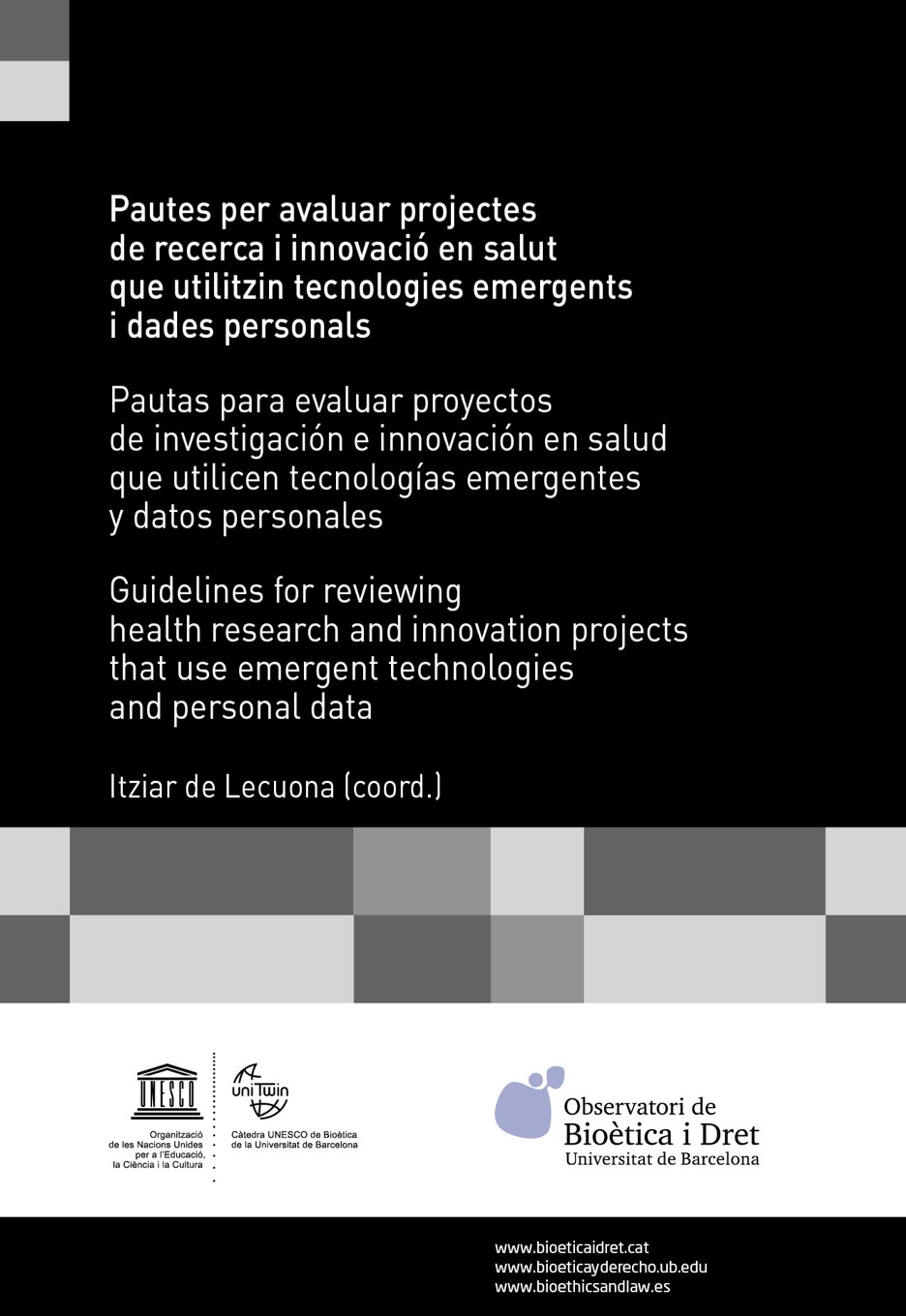The Bioethics and Law Obs.
Master in Bioethics and Law
Master in Food Ethics and Law
UNESCO Chair in Bioethics
Contact
- Bioethics and Law Observatory
- UNESCO Chair in Bioethics
- University of Barcelona
- Faculty of Law
- Ave. Diagonal, 684
- 08034 Barcelona
- (+34) 93 403 45 46
- obd.ub@ub.edu
- Master in Bioethics and Law
- (+34) 93 403 45 46
- master.bd@ub.edu
OBD publishes a report on the assessment of research projects on health with emerging technologies and personal data
 The interests of science, technology and society should not prevail over those of the individual. Guaranteeing this principle is one of the main tasks in the research ethics committees (CER), interdisciplinary collegiate bodies set by the law which analyse the scientific validity of research studies and its social value, and which study the rights and interests at stake. Over the last years, the task of the CERs has broadened: not only they assess clinical trials with drugs and medical products but they also analyse projects that use emerging technologies such as artificial intelligence, big data, biometrics and virtual reality, among others.
The interests of science, technology and society should not prevail over those of the individual. Guaranteeing this principle is one of the main tasks in the research ethics committees (CER), interdisciplinary collegiate bodies set by the law which analyse the scientific validity of research studies and its social value, and which study the rights and interests at stake. Over the last years, the task of the CERs has broadened: not only they assess clinical trials with drugs and medical products but they also analyse projects that use emerging technologies such as artificial intelligence, big data, biometrics and virtual reality, among others.
In this context, the Opinion Group of the Bioethics and Law Observatory – UNESCO Chair in Bioethics at the University of Barcelona (OBD) has published the report Guidelines for reviewing health research and innovation projects that use emergent technologies and personal data, in which they treat challenges, unsolved questions and problems that arise in the research and health innovation projects.
In its first part, the report analyses the current situation and focuses on the use of personal data. The situation of the pandemic has presented several ethical challenges, for instance those related to the development of applications that request personal data and add geolocation. This kind of challenges are also presented in those projects that develop COVID-19 prediction systems based on the programming of algorithms that feed from different sets of personal data, stored in clinical records and other data bases.
The report reminds the reader that this altruistic and solidary model, which involves a transfer of personal data, “should revert to treatments and interventions for the owner of the data or the patients and future generations”. It can also involve knowledge gaining without direct benefit, according to the researchers. However, this transfer “cannot mean that certain sets of personal data should be at everyone’s reach, specially those regarding health”, they note. Access to personal data with healthcare and research purposes includes the professional’s right to keep data secret in order to maintain the confidentiality of the data.
“We cannot guarantee anonymity anymore”
“We went from being anonymous to being re-identifiable”: this is one of the main statements in the third part of the report, which analyses the aspects to take into account for an appropriate protection. Among other, it notes that the current CERs “do not have the appropriate composition nor the necessary skills to assess research and innovation projects” that are presented in the document.
In the final part, the OBD researchers provide recommendations aimed at CERs about the research and health innovation projects that use personal data, as well as the need to introduce profiles of experts on emerging technologies. It also includes recommendations aimed at research and innovation centers to build these committees properly and ensure its independence, and to include the figure of a delegate for data protection.
This publication warns the legislators about the need to develop a regulation for CERs, and to introduce responsible research and innovation (RRI) in a “real and quantifiable” manner, promoted by Europe.
The report Guidelines for reviewing health research and innovation projects that use emergent technologies and personal data has been coordinated by the assistant manager of OBD and lecturer at the Department of Medicine, Itziar de Lecuona. It is published in Catalan, Spanish and English.




